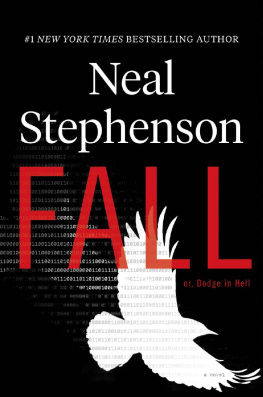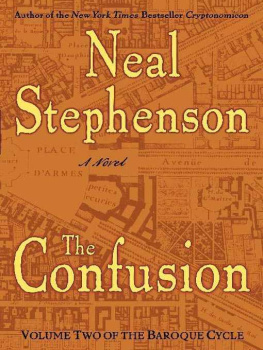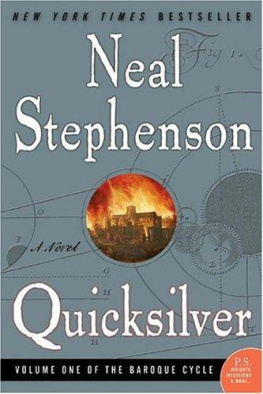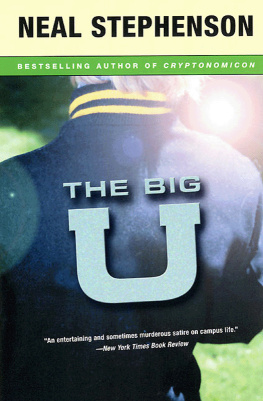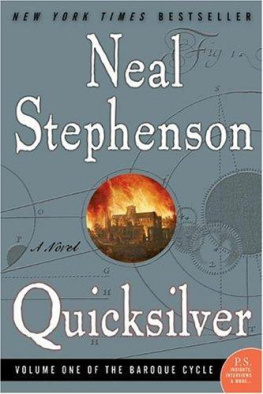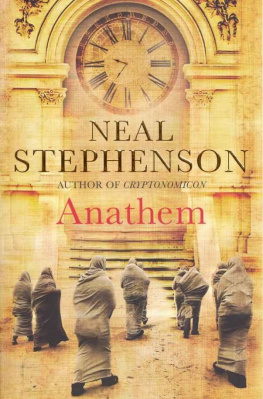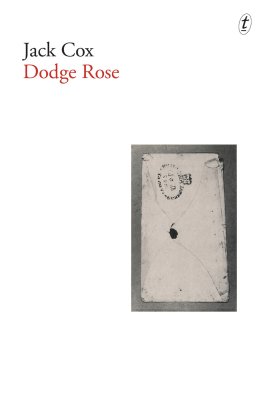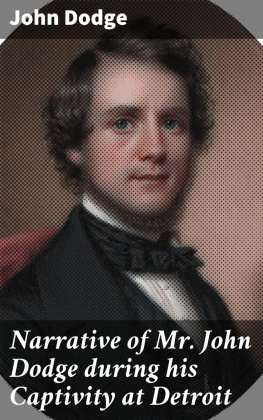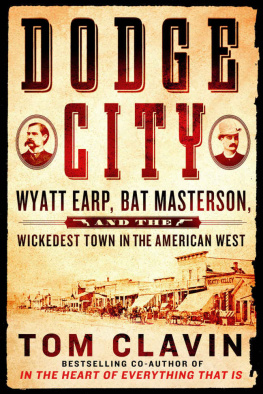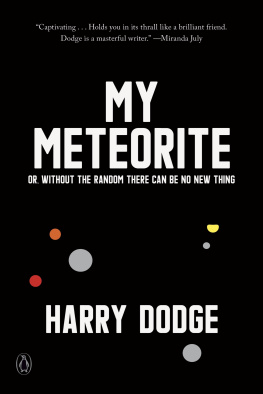to O. L.
Contents
D odge became conscious. His phone was burbling on the bedside table. Without opening his eyes he found it with his hand, jerked it free of its charging cord, and drew it into bed with him. He tapped it once to invoke its snooze feature. It became silent. He rolled onto his side and slid the phone under his pillow so that, when the alarm resumed in nine minutes, he would be able to put it back into snooze mode with less trouble. It was a small miracle that his brain contained a sufficient 3-D model of his bed and its surroundings that he was able to do what he had just done without opening his eyes. But there was no reason to press his luck.
He felt no particular desire to go back to sleep, for he had been enduring a curiously boring dream whose central plot seemed to be the difficulty of finding coffee. In this dream, he was in the small town in Iowa where he had grown up. Its landscape and its cast of characters were commingled with places he had been and people he had encountered during the decades since he had left it in the rearview mirror of his pickup truck. But the grid street pattern of that town, covering just a few square blocks, and easily mastered by a boy on a bicycle, was, decades later, the spatial lattice on which virtually all of his dreams were constructed. It was the graph paper on which his mind seemed to need to plot things.
In the dream, he had set out to get some coffee, only to find himself thwarted at every turn by any number of incredibly prosaic obstacles. In the story-world of the dream, this was bizarrely frustrating; it was simply unreal how so many contingencies could get in the way of this simple task.
But from the point of view of the awake, or at least snoozing, Dodge, it all had a clear explanation: it was, in fact, very difficult to obtain coffee while lying in bed with ones eyes closed.
During the next hour, he hit snooze several more times. In between, he slept. But it was a twilight sleep, semiconscious and mindful for a few minutes at a time, until his thoughts would lose coherence and stray into blurry wisps that were to real dreams as cobwebs are to spiderwebs.
He wondered whether the designers of the phone had performed clinical studies on snoozers in order to decide on the nine-minute interval. Why not eight minutes, or ten? The makers of the phone were famously particular about design. This had to have been data-driven. It was no coincidence that Dodge was being afforded just enough time to lose the thread of consciousness before the alarm went off again. If the interval had been much shorter, he would not have had time to drift off and so this feature could not have truly been called a snooze alarm. Much longer, and the snooze would have deepened into true sleep. He was able to maintain a rough count: I have hit the snooze button three times. Five times. Enough times that I have overslept by about an hour.
But no sense of guilt or urgency attended these makeshift calculations. He knew it didnt really matter, because during the interval of consciousness that had followed the third tap of the snooze button he had remembered that he was not expected in the office today. For he was scheduled to undergo a routine outpatient medical procedure at eleven in the morning, which was still hours away.
Other than the desire for coffee, the only thing that was making him feel any pressure to get out of bed was, curiously, a mild awareness that all of this extra sleeping was going to make it harder for him to have his afternoon nap. This happened every day at two or two thirty. He had been doing it religiously for about a decade. When he had taken up the practice, he had wondered if it was age related, since the oldsters in his family were known for nodding off in church pews, on porch swings, or even behind the wheel. But he could remember being eighteen years old, driving all over the western United States and Canada in various beat-up vehicles, and being overtaken every afternoon by a need for sleep so intense it was almost painful. Hed always tried to fight it off, or else simply avoided driving at that time of day. The only things that had really changed since then were that he was richer, so he could have a private office with a yoga mat and a pillow in the corner, and he was wiser, so he knew better than to fight the midafternoon lull. By closing the door, silencing his electronics, unrolling the mat, lying down, and letting sleep take him for twenty minutes, he was able to refresh himself to a degree that would then keep him working alertly for several hours more.
The amount of time spent asleep didnt really matter. He had decided that the key to it allthe one thing that determined whether the nap would actually refresh himwas the breaking of the thread of consciousness: that moment when he ceased to think in a coherent, sequential, self-aware way and went adrift. Often, this was connected with a jolt of an arm or a leg as he stepped over the threshold from conscious thinking into a dream where he was obliged to reach out and catch a ball or open a door or something. If the jolt didnt wake him up, then it meant he had snipped the thread of consciousness and that the nap had thereby achieved its only real purpose. Even if he woke up ten seconds later, he would be as refreshedpossibly more soas if hed slumbered deeply for an hour.
He had studied the jolt. On those increasingly rare occasions when he slept with a woman, he would sometimes will himself to stay awake as she fell into slumber, listening to her breathing and feeling her body go soft against his until, just at the moment when she drifted away, she would convulsively move a limb.
His business activities (he was the founder and chairman of a large video game company) sometimes involved flying in a private jet to the Isle of Man, eight time zones away, where a longtime business associatean independently wealthy writerdwelled in a renovated castle. The writer would put him up in a bedchamber in one of the towers: a round room decorated with medieval bric-a-brac and warmed by burning wood in a fireplace built into the wall. The bed was a four-poster with a heavy canopy. A couple of years ago, after climbing into that bed and lying there sleepless for a while, Richardfor that was Dodges real namehad finally drifted off and fallen into a nightmare involving a very dangerous and unpleasant character he had tangled with some years earlier. He had awakened to the hallucinatory awareness that this man was standing next to his bed looking down at him. Which was impossible, since the man was deadbut Richard had been in a half-dreaming state where logic did not hold sway, and all he knew was what he saw. He tried to sit up. Nothing happened. He tried to raise his arms. They did not move even the tiniest amount. He tried to draw breath and scream, but his body did not respond to the command from his brain. He was perfectly helpless, lacking even a bound captives power to struggle against his bonds. All he could do was experience the terror of it, and the horror of his complete lack of agency, until somehow he drowsed off again.
Moments later, he had awoken with a start, and sat up convulsively. His body worked again. He threw off the heavy duvet and swung his feet off the bed, turning to face the dying fire a few feet away. No one else was in the chamber. The massive fortress-style door was still bolted. The nightmare impression, which had been so convincing a minute ago, now seemed ridiculous. Lying back down experimentally, he looked up and saw that the lamp on his bedside table was casting a firelight shadow onto the canopy above him, and that the shadow moved about as the fire flickered and the logs settled. He must have half-opened his eyes while sleeping and interpreted this as the shadow of a man.

